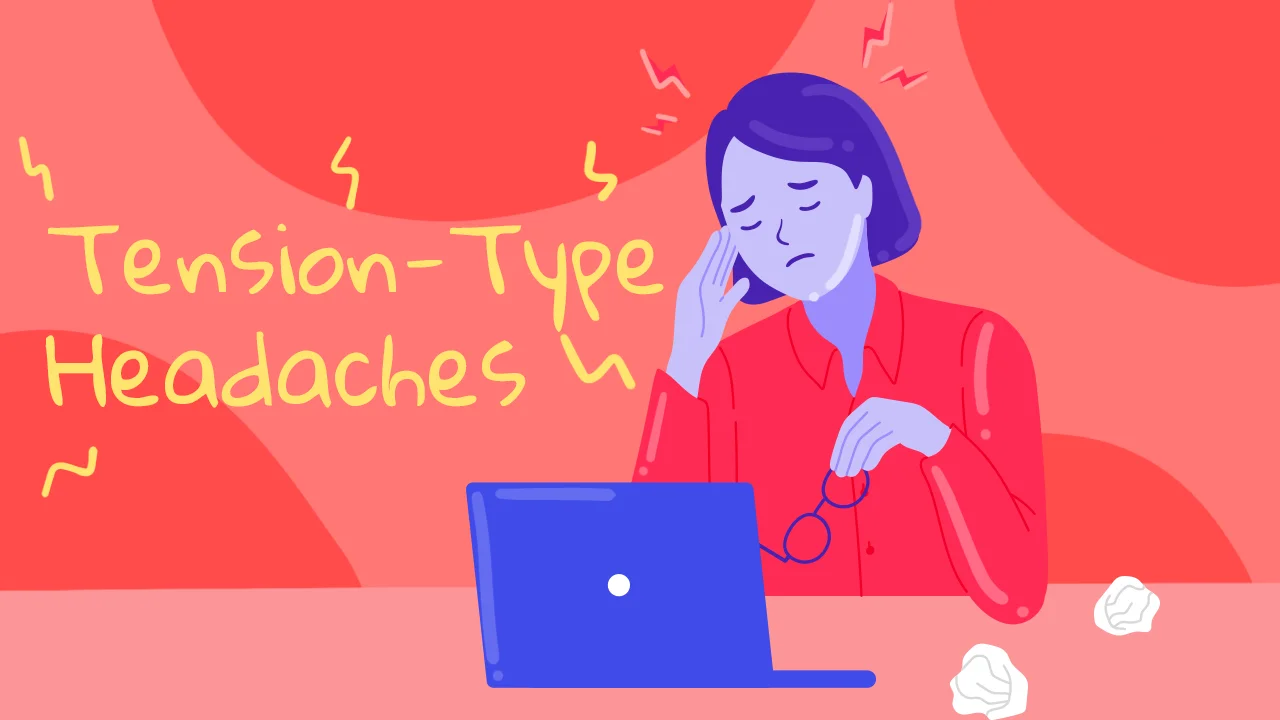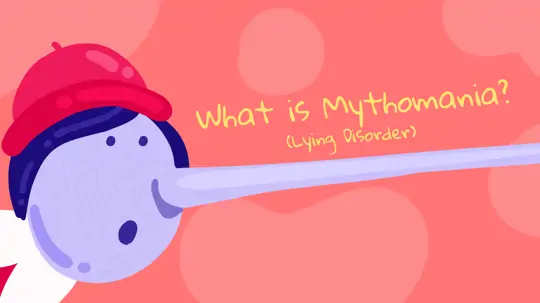
Start feeling better today!
Connect with your therapist today and take control of your life like our 850.000 happy clients.
Get StartedWhat is a Tension-Type Headache?
A tension-type headache is the most common type of headache. It is characterized by mild or moderate pain around the head, temples, forehead, and neck1. If you're experiencing a headache that feels like a tight band is squeezing around your head, you might be dealing with a tension-type headache.
Research indicates that everyone experiences headaches at some point2. However, the intensity and frequency of these headaches can vary significantly from person to person; some may experience them mildly or rarely, while others may encounter severe or frequent headaches.
Headaches vary in type, cause, and duration for numerous reasons. Tension-type headaches are one kind that can make daily life challenging and impede both mental and physical processes.
Although it is thought to be caused by stress, a tension headache can be caused by many factors. Tension-type headaches are usually not accompanied by other symptoms and are not considered dangerous. Studies have proven that women experience tension-type headaches more frequently than men. 69% of men experience tension-type headaches at least once in their lives, compared to 88% of women.
You may have noticed that school-age children also suffer from headaches from time to time. Tension headache does not only affect adults, and the proportion of children with tension headache may be higher than you think. 75% of teenagers and adolescents experience tension headaches at least once, and in 10% of these children, the headache is recurrent1, 3.

Symptoms of Tension Headache
Tension-type headaches do not have side effects like some other types of headaches. There are no accompanying negative conditions such as sensitivity to light, vomiting, fainting, or nausea. Symptoms of tension headaches include:
- A feeling of tight pressure in the front and back of the head
- Tension and tenderness in the neck and shoulder muscles
- Headache lasting for at least 30 minutes
- Pain starting from the neck and progressing towards the head
- Difficulty concentrating
- Headache following an intense emotion such as stress, anxiety, or fear
Characteristics of Tension Headache
Understanding the characteristics of a tension headache is crucial for identifying and managing this common condition. Tension headaches manifest with distinct features that set them apart from other types of headaches. Below are some key characteristics that typically define a tension headache, shedding light on its onset, duration, and impact on daily activities.
- It usually starts in the afternoon and lasts for 30–40 minutes.
- It is not a type of pain that prevents you from performing daily routines.
- There is no sensitivity to light or sound.
Where in the Body Is Tension Headache Felt?
Migraine and tension headaches are two types of headache that are often confused and compared. Tension headaches do not affect a single spot like migraines. It is more widespread and gets worse as the pain progresses5.
A tension-type headache usually manifests itself as pain radiating to the temples, back of the head, around the back of the head, and into the neck and shoulders.
What Are the Causes of Tension-Type Headache?
Although stress is considered to be the main cause of tension-type headaches, stress is not the only factor in the development of this type of headache4. The causes of tension headaches are the following:
- Tension in the muscles of the head and neck
- Intense negative emotions such as anxiety and fear
- Sitting in the same position for a long time or being inactive
- Some psychological problems (such as anxiety disorder and depression)
- Head trauma
- Sleeping too much or too little
- Poor diet (eating inadequately or eating too much food)
- Being in too noisy environments
- Some other health problems (For example, in some cases, dust allergies trigger tension-type headaches.)
Relationships have been found between tension-type headaches and mental problems. For example, it has been observed that people with frequent tension-type headaches have a high sensitivity to anxiety6.
In other words, people with intense headaches are more sensitive to anxious situations and environments and become anxious more easily. People with anxiety sensitivity (those who worry more easily) are more fearful of headaches, and this fear can cause them to suffer from headaches7.

Research has shown that people exposed to trauma in childhood suffer more headaches in adulthood. Childhood traumas can also be a contributing factor in the development of tension-type headaches.
However, it is worth noting that tensionn-type headaches are one of the most common types of headaches, and people can experience tension-type headaches even if they have no history of trauma or mental health problems.
Treatment of Tension Headache
The first thing that comes to everyone's mind when they think of headaches is to resort to painkillers. Although there is no specific painkiller for tension headaches, doctors can prescribe combinations of medications according to the condition and needs of patients. Over-the-counter painkillers may provide short-term relief but may cause different types of headaches and some health problems6, 7.
Headache can have negative effects on an individual's mood and the functioning of their daily life. Tension-type headaches can make people more aggressive and lead to a decrease in quality of life. In this case, getting support from a psychological counselor or therapist will help you accept the situation and move forward.
In addition, treatment methods aimed at physical relaxation can also be used effectively:
- Physiotherapy
- Intramuscular Stimulation
- Trigger Point Injections
- Medical Massage
These methods are very useful in the treatment of tension-type headaches because they relax the contractions in the shoulder and neck muscles that cause the headache or that occur with the headache.
How to Relieve a Tension Headache
Unfortunately, there is no medication that can miraculously relieve tension headaches and guarantee that you will not suffer from them again. Therefore, we recommend that you stay away from over-the-counter medications that promise miraculous results. Always consult your doctor before taking medication treatments.
In addition to seeking professional help, there are many treatments available to relieve this type of headache. Most people who suffer from headaches look for a solution on their own. In fact, one of the most researched questions is "How to relieve tension headaches at home?". Let's take a look at what we can do to get rid of tension headache.
Tips for Headache Relief
- Pay attention to your posture. Incorrect posture, especially when working at a desk, increases spinal tension and can lead to headaches.
- Regularly practicing relaxing sports such as walking and yoga can be a long-term solution for tension headaches.
- Do activities that help you manage stress better (such as meditation and self-compassion practices). Stress is one of the main causes of headaches.
- Avoid tobacco products. Using and inhaling tobacco products trigger headaches.
- Apply hot and cold compresses. Taking a hot shower or holding an ice pack to the head can help with the pain.
Stress is one of the main causes of tension headaches. If you think you experience stress in your daily life, you can find out about your stress level by taking the stress test, which you can easily and free of charge take on your own.
References
- AKÇA, Ö. F., ÖZKAN, M., & TEBER, S. T. (2013). Anxiety sensitivity and dissociative symptoms in adolescents with migraine and tension-type headache. Anatolian Journal of Psychiatry/Anadolu Psychiatry Journal, 14(2).
- Sayılgan, N. , Güleç, H. , Domaç, F. M. (2018) "Psychosomatic diagnosis in patients with migraine and tension-type headache" . Cukurova Medical Journal 43;262-267
- Passchier J, Orlebeke JF. (2000). Headaches and stress in schoolchildren: An epidemiological study. Cephalalgia 167-76.
- Sönmezler, A., İbrahim, Ü. N. A. L., & Yoldaş, T. K. (2013). The effects of migraine and tension-type headache on health-related quality of life. Cukurova Medical Journal, 38(3), 374-381.
- Öztürk, M., Öngel, B., Öztürk, Y., Soy, D., Altunkaynak, Y., SÖZMEN, V., & BAYBA, S. (2001). Pain and socioeconomic characteristics in migraine and tension-type headaches. Thinking Man: Journal of Psychiatry and Neurological Sciences, 14, 48-52.
- Powers SW, Gilman DK, Hershey AD. (2006) Headache and psychological functioning in children and adolescents. Headache. 46:1404-15. 9.
- Norton PJ, Asmundson GJG.(2004) Anxiety sensitivity, fear, and avoidance behavior in headache pain. Pain. 111:218-23.





